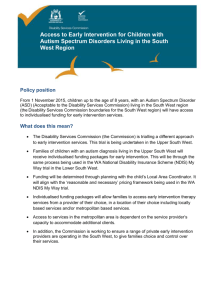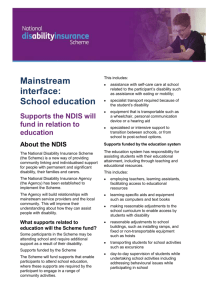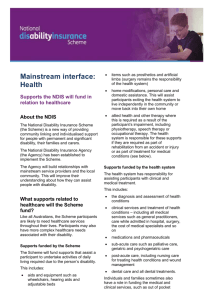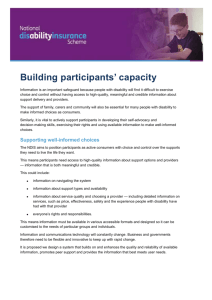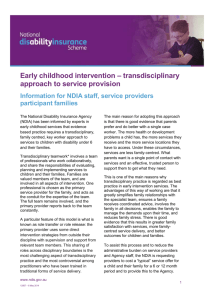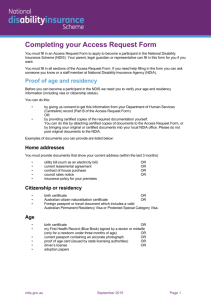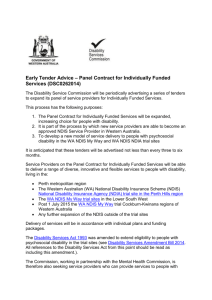Fact sheet: Supports the NDIS will fund in relation to early childhood
advertisement
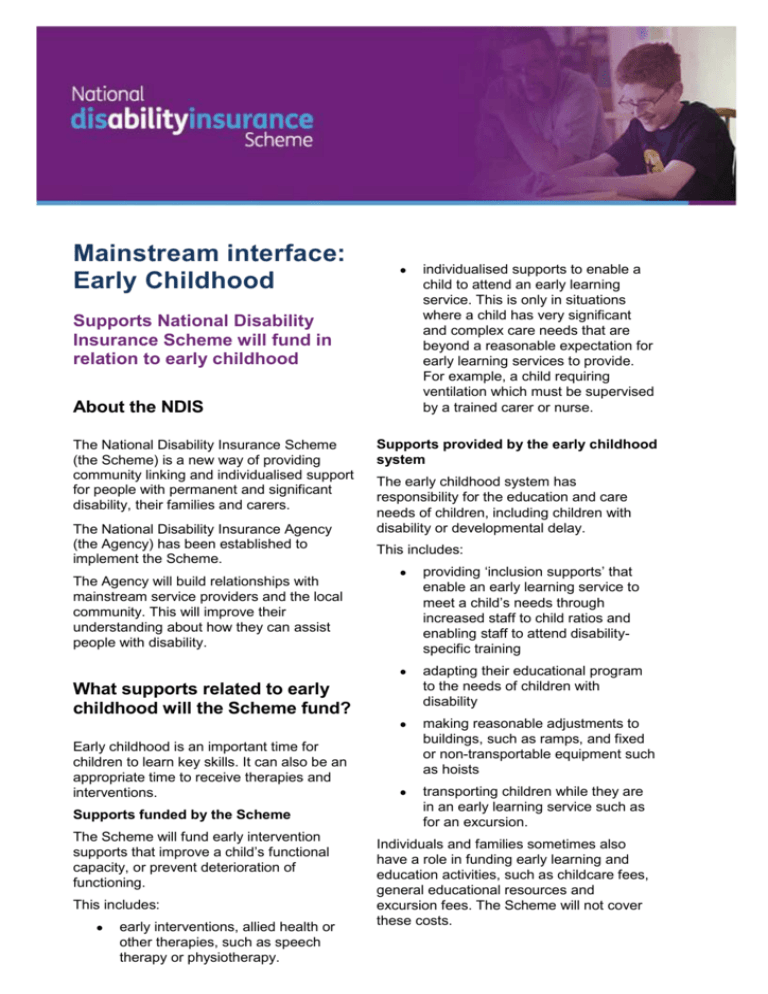
Mainstream interface: Early Childhood Supports National Disability Insurance Scheme will fund in relation to early childhood About the NDIS The National Disability Insurance Scheme (the Scheme) is a new way of providing community linking and individualised support for people with permanent and significant disability, their families and carers. The National Disability Insurance Agency (the Agency) has been established to implement the Scheme. The Agency will build relationships with mainstream service providers and the local community. This will improve their understanding about how they can assist people with disability. What supports related to early childhood will the Scheme fund? Early childhood is an important time for children to learn key skills. It can also be an appropriate time to receive therapies and interventions. Supports funded by the Scheme The Scheme will fund early intervention supports that improve a child’s functional capacity, or prevent deterioration of functioning. This includes: early interventions, allied health or other therapies, such as speech therapy or physiotherapy. individualised supports to enable a child to attend an early learning service. This is only in situations where a child has very significant and complex care needs that are beyond a reasonable expectation for early learning services to provide. For example, a child requiring ventilation which must be supervised by a trained carer or nurse. Supports provided by the early childhood system The early childhood system has responsibility for the education and care needs of children, including children with disability or developmental delay. This includes: providing ‘inclusion supports’ that enable an early learning service to meet a child’s needs through increased staff to child ratios and enabling staff to attend disabilityspecific training adapting their educational program to the needs of children with disability making reasonable adjustments to buildings, such as ramps, and fixed or non-transportable equipment such as hoists transporting children while they are in an early learning service such as for an excursion. Individuals and families sometimes also have a role in funding early learning and education activities, such as childcare fees, general educational resources and excursion fees. The Scheme will not cover these costs. What types of early intervention supports will the Scheme fund for children? The Scheme can fund supports that build a participant’s functional capacity, while other systems such as the health system have a responsibility to provide supports that treat health conditions, improve general health and wellbeing or are clinical in nature. The Scheme will fund supports such as physiotherapy, audiology, occupational therapy, podiatry, speech and language pathology. The Scheme can also fund behaviour support such as creating a plan to reduce or prevent behaviours of concern. Other systems will be responsible for supports that are not required as a result of the child’s disability, or which are clinical in nature. This includes medical services such as appointments with General Practitioners, surgery, care in hospital, pharmaceuticals, surgically inserted devices such as a pacemaker or metal pins and rods. What happens if another system doesn’t fund the supports I need? If the early childhood or health system is responsible for a support, the Scheme cannot fund that support, even if the early childhood or health system does not provide it. ndis.gov.au However, the Scheme may still able to provide assistance to participants, for example, a Local Area Coordinator can assist the participant to make contact and discuss their needs with appropriate providers. What happens next? Participants and their families will discuss their goals with the Agency as part of their planning conversation. The participant’s plan will include the supports the Scheme will fund for participants and any other supports they may require from the early education and health systems. More information Visit ndis.gov.au Email enquiries@ndis.gov.au Call 1800 800 110* Monday to Friday, 9.00am to 5.00pm EST. For people with hearing or speech loss: - TTY: 1800 555 677 - Speak and Listen: 1800 555 727 - For people who need help with English TIS: 131 450 *1800 calls are free from fixed lines; however calls from mobiles may be charged. 2


